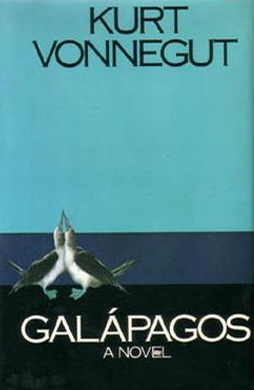
Galapagos by Kurt Vonnegut
Here’s a visionary satirical look at how mankind might have evolved, given different circumstances. The premise of the story is a simple one: transport a few famous folks back in time -- far, far back in time -- to the evolutionary start of a new human race in the murky subtropical environment of the Galapagos Islands. What they don’t realize right away is that they will, for better or worse, become the progenitors of all men and women from this moment forward, and the results are, well, enlightening. As a Goodreads reviewer observes: “America’s master satirist looks at our world and shows us all that is sadly, madly awry–and all that is worth saving.” Kelsi Vanada, writing for an online forum called Crevice.ro, says, “The novel critiques evolutionary processes on a large scale, arguing that 'Our brains are much too large (and have proven) to be terribly destructive.’ The human brain, Vonnegut says, enables humans to harm each other, to the point that we can eliminate whole societies through nuclear warfare. It would be better for evolution to work the other way — toward simpler brains, toward basic, non-higher-level thinking.’”
About Kurt Vonnegut
Born on November 11, 1922, in Indianapolis, Indiana, Kurt Vonnegut has been called “one of the most influential American novelists of the twentieth century”. He studied at Cornell University for two years before deciding to enlist in the U.S. Army -- a decision which eventually resulted in his capture and internment in a Dresden, Germany POW camp. When Dresden was carpet bombed by Allied forces, Vonnegut escaped harm by hiding in a meat locker along with other POWs. It was a pivotal moment and Vonnegut never forgot it. One of his best-known works, Slaughterhouse-Five, draws some of its dramatic power from his own experiences, says a review on Biography.com. And, of Galapagos, the venerable New York Times says; “Mr. Vonnegut's work long ago broke ground for such writers as Richard Brautigan, Thomas Pynchon, Donald Barthelme, Tom Robbins - all curators of the rhetorical and cultural non sequitur. But Mr. Vonnegut's grumbly and idiomatic voice has always been his own, unfakeable and childlike, and his humanity, persisting as it does through his pessimism, is astonishing, seeming at times more science fiction than his science fiction.”Futurist Themes:
- Evolutionary Theory
- Human Intellectual Advancement as a Detriment
© Copyright 2021. All Rights Reserved. | Made and Maintained by Virtual Crayon
